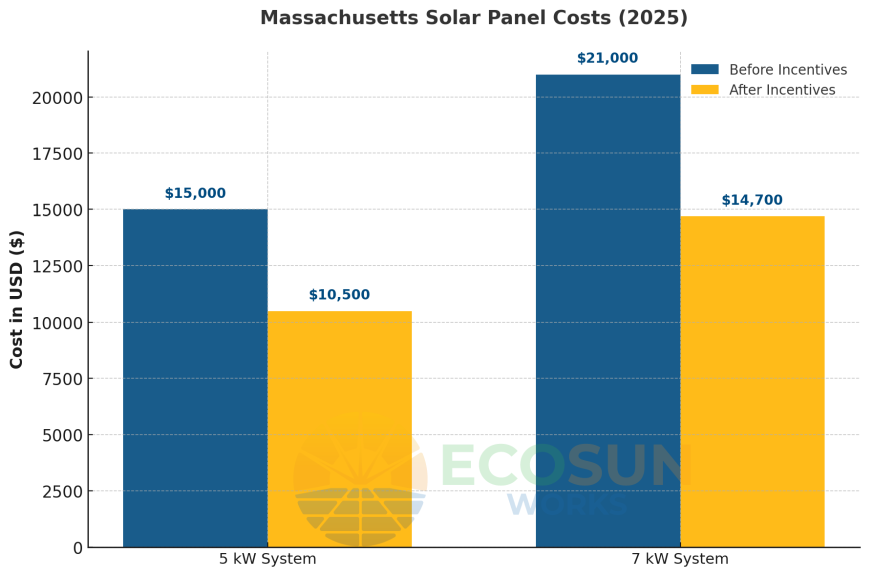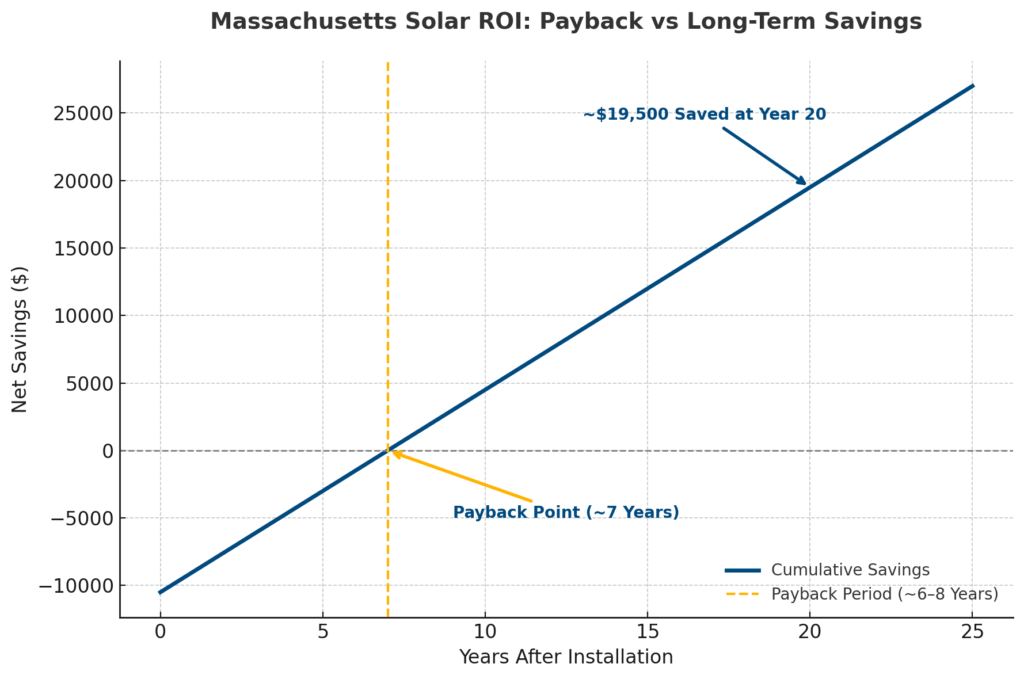How Much Do Solar Panels Cost in Massachusetts in 2025?
Electric bills in Massachusetts keep climbing, and for many families, that monthly number feels heavier than ever. If you’ve been thinking about ways to take control of your energy costs, you’re not alone. Homeowners across the state are asking the same question: how much do solar panels cost in Massachusetts in 2025?
The good news is that the numbers are clearer than you might think. Right now, the average price per watt of solar in Massachusetts runs between $2.85 and $3.25, which means a typical home system of 5–7 kW costs around $14,000 to $22,000 before incentives. At first glance, that may sound steep — but here’s the part that makes solar genuinely affordable. Federal and state programs, including the 30% Federal Tax Credit and Massachusetts’ own rebates, can slash thousands off that total. For many homeowners, the real out-of-pocket cost ends up closer to $10,000–$15,000, not $20,000+.
So instead of being stuck with ever-rising utility bills, you can lock in long-term savings, increase your home’s value, and protect yourself from future rate hikes. Over the next few sections, we’ll break down the exact costs, incentives, and savings so you can see whether solar makes sense for your home.
Average Cost of Solar Panels in Massachusetts (2025 Update)
When it comes to solar panel prices in Massachusetts, the math usually starts with cost per watt. In 2025, the average solar installation cost in MA falls between $2.85 and $3.25 per watt. What does that actually mean for your home?
For a typical residential system — usually between 5 kW and 7 kW — that translates into a total system price of about $14,000 to $22,000 before incentives. The exact number depends on factors like roof size, energy usage, and the type of solar panels you choose, but this range gives a realistic baseline.
And here’s the part most homeowners are relieved to hear: very few people actually pay that full sticker price. Federal and state incentives can reduce the upfront expense by thousands, making solar much more accessible than it first appears.
Quick Answer:
In Massachusetts, the average cost of solar panels is about $14,000–$16,000 before incentives in 2025, and around $10,000–$11,000 after tax credits and rebates.
By thinking in terms of both “before” and “after” incentives, you can see the true average system cost in Massachusetts — not just the scary number before rebates kick in.
Federal and Massachusetts Solar Incentives That Lower Costs
One of the biggest reasons solar has taken off in the Bay State isn’t just high electricity prices — it’s the stack of rebates and solar incentives Massachusetts homeowners can use to cut costs. These programs shrink the upfront price tag and accelerate the payback period, making solar far more affordable than the raw system price suggests.
30% Federal Solar Investment Tax Credit (ITC)
Every homeowner in Massachusetts who installs solar in 2025 qualifies for the 30% Federal ITC. This credit directly reduces your federal tax liability. For example, on a $15,000 solar installation, the ITC alone saves you about $4,500.
$1,000 Massachusetts State Income Tax Credit
In addition to the federal credit, the state offers a $1,000 Massachusetts State Solar Credit. Think of it as an extra bonus layered on top of the ITC, further lowering what you owe.
SMART Program (Solar Massachusetts Renewable Target)
The SMART Program Massachusetts is a long-term incentive that pays homeowners per kilowatt-hour (kWh) their system generates for up to 10 years. It’s essentially a guaranteed revenue stream for producing clean energy, making solar panels not just an expense but a source of steady savings.
Sales and Property Tax Exemptions
Unlike other major home improvements, installing solar doesn’t saddle you with higher taxes. Massachusetts exempts solar systems from both sales tax at installation and property tax on the value added to your home. That’s money in your pocket right from the start.
When you combine these Massachusetts solar rebates and incentives, the difference is dramatic. A system that starts at $15,000 can fall to $10,000–$11,000 net cost after credits — and then continue generating long-term savings through SMART payments and reduced utility bills.
How Much Do Solar Panels Cost in Massachusetts After Incentives?
So, after all the rebates and credits are applied, how much do solar panels cost in Massachusetts in 2025? The answer is often thousands less than the sticker price you first see.
Let’s break it down with two common system sizes:
- A 5 kW solar system in Massachusetts averages around $15,000 before incentives. After applying the 30% Federal Tax Credit and the $1,000 state credit, the net solar cost in MA drops to about $10,500.
- A 7 kW system, typically priced near $21,000 before incentives, falls closer to $14,700 post-incentives.
Here’s a quick comparison of what that looks like:

These numbers highlight the real picture: while the average system price in Massachusetts looks high at first glance, the post-incentive solar price is far more approachable. Add in the SMART program’s long-term payments, and the value of going solar becomes even stronger.
Massachusetts Solar Savings and Payback Period

Once you understand the upfront costs, the next question is simple: what do you actually save by going solar in Massachusetts?
On average, homeowners see solar savings in Massachusetts of $30,000–$40,000 over 20–25 years. That’s not just a nice bonus — it’s a life-changing financial return for many families. With rising electric rates, every kilowatt-hour you generate from your own roof is one less you’re buying from the utility.
The payback period for solar panels in Massachusetts typically runs about 6 to 8 years. After that point, the system has already paid for itself, and everything you generate is pure savings. In other words, most of your system’s 25+ year lifespan is spent enjoying electricity with little to no bill.
It helps that Massachusetts electricity rates are among the highest in the U.S., averaging well above the national level. This makes the solar ROI in MA stronger than in many other states. The higher your current utility costs, the faster solar pays for itself.
So whether you’re looking at the short-term payback or the long-term benefits, Massachusetts homeowners are in a uniquely strong position to maximize their return on solar.
Comparing Solar Panel Costs Across Massachusetts Cities
While state averages give a big-picture view, it’s worth noting that solar prices can vary slightly depending on where you live. Factors like installer availability, permitting rules, and roof type all play a role.
- In Worcester, the average solar installation comes in at around $15,000 before incentives. After applying tax credits and rebates, that number drops closer to $10,500. Learn more on our Worcester solar page.
- In Boston, costs trend toward the higher side, often $16,000–$18,000 before incentives, due to tighter permitting and higher labor rates.
- Springfield homeowners benefit from statewide programs like the SMART incentive while paying roughly the state average — making Springfield solar incentives a strong driver of ROI.
- In Lowell, system pricing is similar to Worcester, though older housing stock can occasionally increase installation complexity.
No matter the city, Massachusetts residents benefit from the same state and federal incentives, which means that while solar costs in Boston or Worcester may look different upfront, the long-term savings stay just as powerful.
FAQs – Massachusetts Solar Panel Prices Explained
We’ve answered some of the most common questions Massachusetts homeowners ask when researching solar panel costs:
Q: How much does one solar panel cost in Massachusetts?
A: On average, a single solar panel in Massachusetts costs $250–$350 before incentives, depending on the brand and efficiency rating.
Q: How many panels does an average Massachusetts home need?
A: Most homes in the state require 15–25 panels to fully cover their electricity usage, though the exact number depends on roof size and annual energy demand.
Q: Is solar worth it in Massachusetts?
A: Absolutely. Thanks to strong state incentives and high utility rates, homeowners typically save $30,000 or more over 20 years with solar.
Q: What’s the cost per watt for solar in MA?
A: In 2025, the average solar cost per watt in Massachusetts is $2.85–$3.25, one of the most competitive ranges in the country.
Conclusion – How Much Do Solar Panels Really Cost in Massachusetts?
So, how much do solar panels cost in Massachusetts in 2025? On average, homeowners can expect system prices of about $14,000–$16,000 before incentives, but thanks to the 30% Federal Tax Credit and the Massachusetts state solar credit, the real out-of-pocket cost often falls closer to $10,000–$11,000.
When you factor in lifetime savings of $30,000–$40,000, plus a payback period of just 6–8 years, the return on investment is one of the strongest in the country. Add to that the protection from rising utility rates, and it’s clear why Massachusetts continues to rank as one of the best states for solar.
If you’re ready to see how much you could save, don’t wait.
👉 Get a personalized quote for your Massachusetts home →
